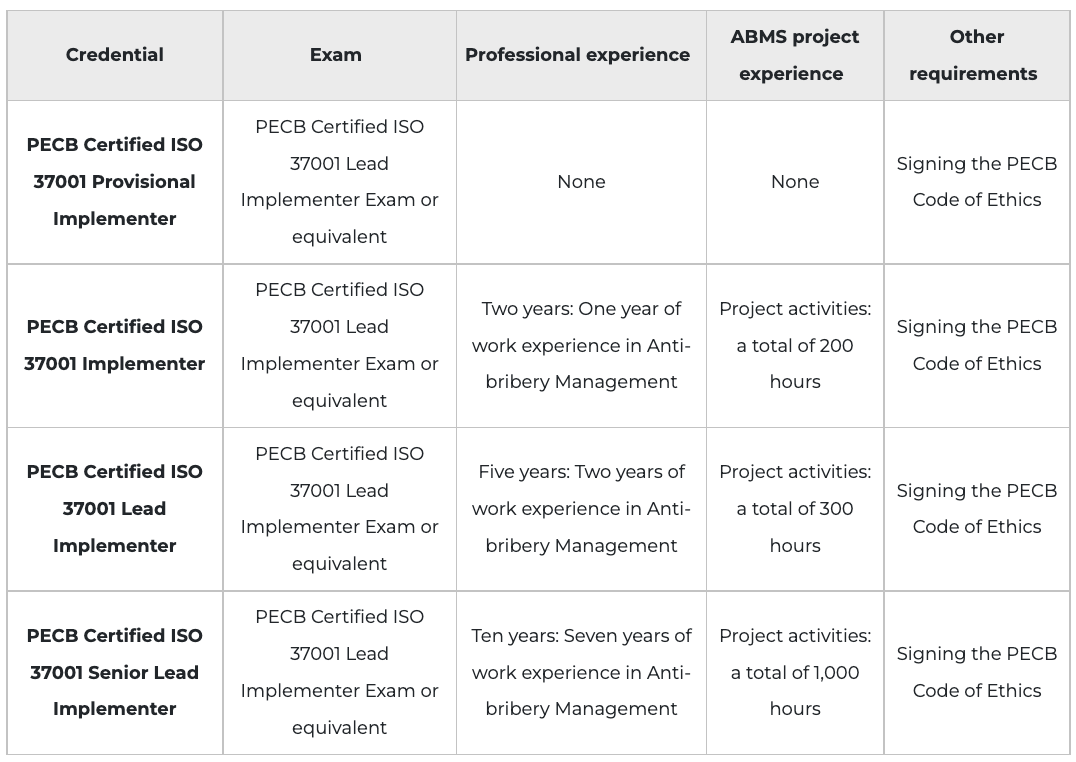The benefits of implementing an anti-bribery management system (ABMS) based on ISO 37001 are manifold: helping the organization avoid or mitigate the costs, risks, and damage of involvement in bribery, promoting trust and confidence, encouraging due diligence and ethically sound business dealings, etc. To gain such benefits for your organization, you must be equipped with the knowledge and skills required to establish, implement, manage, maintain, and continually improve an ABMS. For that, the PECB ISO 37001 Lead Implementer training course is the right place to be. The training course aims to provide in-depth understanding of ISO 37001 requirements, as well as the best practices and approaches used for the implementation and subsequent maintenance of the management system.
By attending the training course, you can help organizations comply with anti-bribery laws, as well as establish controls within the organization that proactively contribute in combating bribery and contribute to the creation of a culture of integrity, transparency, openness, and compliance.
By the end of this training course, the participants will be able to:
The ISO 37001 Lead Implementer training course is intended for:
Upon the successful completion of the exam, you can apply for one of the credentials shown in the table below. You will receive a certificate once you fulfill all the requirements related to the selected credential. For more information about ISO 37001 certifications and the PECB certification process, please refer to the Certification Rules and Policies.

The main requirements for participating in this training course are: a basic knowledge of ISO management system standards, a general understanding of ISO 37001, and an awareness of the MS implementation principles.
Introduction to ISO 37001 and the initiation of an ABMS
Implementation plan of an ABMS
Implementation of an ABMS
ABMS continual improvement and preparation for the certification audit
Certification Exam
The exam is will take place at the end of the course on onsite classroom courses
For Virtual courses we will send out a voucher that gives you access to an online exam. This can be booked and taken home monitored by a proctor via camera. More information about the exam rules will be send from PECB.
Test details:
As the exam is an Multiple Choice, candidates are authorized to use:
Examination rules and policies
Results will be communicated by email in a period of 6 to 8 weeks, after taking the exam. The results will not include the exact grade of the candidate, only a mention of pass or fail.
Candidates who successfully complete the examination will be able to apply for a certified scheme which is explained in the course description.
In the case of a failure, the results will be accompanied with the list of domains in which the candidate had failed to provide guidance for exams’ retake preparation.
Candidates, who disagree with the exam results, may file a complaint by writing to examination@pecb.com or through PECB ticketing system.
There is no limit on the number of times a candidate may retake an exam. However, there are some limitations in terms of allowed time-frame in between exam retakes, such as:
After the fourth attempt, a waiting period of 12 months from the last session date is required, in order for candidate to sit again for the same exam. Regular fee applies.
For the candidates that fail the exam in the 2nd retake, PECB recommends to attend an official training in order to be better prepared for the exam.
To arrange exam retakes (date, time, place, costs), the candidate needs to contact Glasspaper.